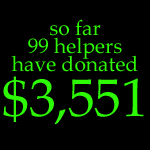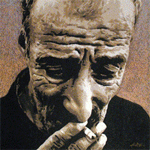Blacks In Sports: The Summer Of LeBron
 Tuesday, February 15, 2011 at 11:39PM
Tuesday, February 15, 2011 at 11:39PM
By JOHN P. WISE
One Great Season
"It's always, um, you know, a race factor."
Those were the clumsy words of one of the galaxy's most recognized athletes not long ago. A shooting superstar among mere stars. A then-25-year-old Mack truck of a ringless NBA phenom.
LeBron James voiced that declaration on CNN last fall, nearly three months after he made his unforgettable free-agency decision on an ill-conceived ESPN program called "The Decision." On a warm Thursday night in July, the self-anointed King James announced in sleepy Connecticut that he was going to take his talents to South Beach to play for the Miami Heat.
What happened 500 miles away in Cleveland immediately afterward and throughout the online universe in the days that followed was nothing short of pure hatred. Cavaliers owner Dan Gilbert's prompt reaction was well-documented, and you've been living under a burning river if you haven't seen at least a dozen times the video of fans burning No. 23 jerseys.
But was the hate born out of race? Can we really ever be sure? Had Peyton Manning broken the hearts of Colts fans to play elsewhere, would a citywide reaction in Indianapolis be traced to his race? Is a hypothetical comparison even relevant?
The reaction from those interviewed for this piece was largely mixed, not only in that some agreed with James' claim about race and others disagreed. Too, there were mixed feelings within each individual reaction. That's not to say folks were indecisive; they all knew where they stood, but felt it important to differentiate between two noteworthy terms.
"You don't find out how someone is perceived until things go badly," said Bomani Jones, Sirius Radio host of "The Morning Jones" and frequent ESPN panelist. "And when things went badly, everybody flipped and you saw how they really felt about LeBron."
Folks surely did freak out, but implying their real feelings were somehow finally revealed after seven years in the closet might be misleading. James, a native of Akron, Ohio, a short drive from downtown Cleveland, gave sports fans in a championship-starved town reason to cheer, believe and even expect for nearly a decade. He had every right to choose to leave the nest, to pursue championships and a more enjoyable lifestyle with friends and fellow stars Dwyane Wade and Chris Bosh in Miami.
But what no one thought he had the right to do was humiliate Cleveland in a never-before-seen type of spectacle on live television that made the city on the lake even more of a laughingstock in the eyes and mouths of talk-radio screamers from coast to coast. It's been said countless times since July 9; it's not that he left, it's how he left that produced the hateful backlash. It wasn't necessarily a case of old feelings long bottled up that finally came to a head. At least for a few, it was simply a case of supporting a hero, then being abandoned by him. Wouldn't you feel hurt?
So if we're to agree there are essentially two schools of thought here, it would make sense to say one suggests the reaction derived from simple, broken-hearted fanaticism. The other postulates it revealed a prejudicial culture that seemingly never will settle its issues with race.
"Race is always in the room," ESPN personality Jemele Hill said. "I know that's difficult for people to accept because we have made a lot of progress in this country. You're not saying racism is the sole factor behind how someone or something is viewed. When some people look at LeBron, they see a young black male who has been catered to. They see a rich black athlete who was disrespectful in how he left his hometown."
Take note that Hill said race is in the room, not racism. Her point is that it's neither good nor bad nor right nor wrong. It's merely present, and it's a point her ESPN colleague and mentor, Michael Wilbon, echoed on the network's "Image Of The Black Athlete" town hall special last month.
"If you say race is involved, it doesn't mean you're a bigot," Wilbon told moderators Bob Ley and Robin Roberts in January. "It means race is involved. And race is involved in everyone's perspective all the time and we need to just get accustomed to that."
It's hard to argue with Wilbon's point, but it's hard also to believe that that's what James meant when he fumbled with his assertion in that interview in September. Maybe Soledad O'Brien asked the wrong question. Maybe someone needs to go back to James and ask if racism was a factor, not just race.
Wilbon's take was a lighter one, meaning simply that race partly shapes how we interpret things. James, rarely known for taking a decisive stand or at least looking smart while doing so, seemed more intent on delivering — albeit awkwardly — a more inflammatory opinion, as if to say he thought the city of Cleveland suddenly saw him as a ... Well, you know.
And if that indeed was the message James was aiming to impart, then AOL FanHouse columnist Terence Moore has a small problem.
"When LeBron and others of his generation claim racism, it minimizes what the Oscar Robertsons and Bill Russells and Wilt Chamberlains had to go through when they had real racism back in the 1950s and 60s," he said. Miami University basketball coach Charlie Coles agreed that James' take was a weak one.
"That was not a fair assessment," said Coles, 69. "Not even in the ballpark. LeBron James is a tremendous basketball player, and he's gotten that hall pass, that's for sure. But those were just fans and people. It would be like someone saying (last month) that it was racist when some black NFL players criticized Jay Cutler. LeBron is a great player, but he was reaching."
Also on that ESPN town hall program, Wilbon reminded us that James was hardly breaking new ground by trying to have some say in where his career would take him. Check that; James' career wasn't going to take him anywhere. He was taking his career — his talents — to South Beach.
"John Elway, one of the most popular players in the history of professional football, did it," he said. "Eli Manning did this. LeBron James is not the first athlete to say, 'I want to control what I do, control my movements, control where I live, control where I work professionally. Athletes have done this since the beginning of time. But when LeBron did this in concert with two other African-American athletes, then (people said), 'Wait a minute. Why are these guys now trying to run their lives?' Because they can. Because they have a leverage that they can do it."
The prominent sociologist, professor and author Dr. Harry Edwards decisively compared the hoopla surrounding the James free agency to what became an annual circus in whatever city Brett Favre was playing quarterback the last few years of his career.
"The difference in treatment was basically that LeBron was black," said Edwards, whose important work has spanned nearly half a century. "If LeBron had not been black, it would have been like, 'Oh, geez, we're waiting to see what LeBron's going to do, and once he makes his decision, that would have been the end of it,' just as it was the end of it when (Favre) left Green Bay, and when he left the Jets. But LeBron is now among the most unpopular athletes in the country after what he did. And Favre, not only (despite) what he did, but also sending text messages and everything else, is still one of the most admired athletes in the country."
If you take the pulse of American sports fans, Favre in most parts is a hero today. James is a villain just about everywhere, and he'll likely become an even bigger one in May and June when his new team competes for what he couldn't win in Cleveland. Regardless of your sensibilities, regardless of who your sports heroes are or how you came to root for them, the Favre-James parallel is a telling one. It teaches little about either as individuals. Instead, it reveals more about us, those who toil in a culture where race is always in the room.
Check back for Thursday's Part IV: "Networking & Relationships."
And you can still read Part I of this report, as well as Part II.













Reader Comments (1)
It was really a good, have I like information!
Abercrombie
Abercrombie & Fitch
Abercrombie and Fitch
Abercrombie Deutschland
I'll come to this website message
Abercrombie Fitch Deutschland
Abercrombie & Fitch Deutschland
Abercrombie and Fitch Deutschland
Hollister Deutschland
Hollister Frankfurt